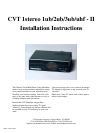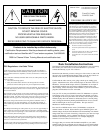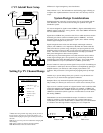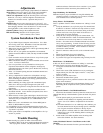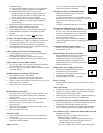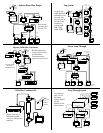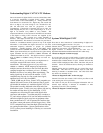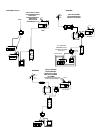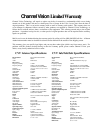
Use a Y-Connector to combine the left and right
audio before entering the modulator.
Herringbone in Picture on Modulated Channel
Disconnect modulator from local channels an
check modulated channel.
A) If there is programming move the modulated channel.
B) If the picture is snowy, use a #3102-78 low pass filter to
block noise or data coming in from cable
company.
C) Separate modulated channels by two channels.
Horizontal Bars Rolling Through TV Picture
1. Check for a component of the system to introduce DC power
into the system. Disconnect that component and
check TV. If the hum bars stop, use a DC blocker
down stream from that component to block the
power from getting to the TVs.
2. If the rolling is only on the modulated channels,
check for impedance mismatch by adjusting the video level
adjustment pot.
Vertical Bars Rolling Through TV Picture
Check for AC power getting on the line. Use a
ground breaker in line.
Black and White Lines on one Local Channel
Move modulated channel up to a new channel. If
problem persists and all of the inputs of a
multiple input modulator are not being used,
check default channels on modulator to see if
default channel is set to the same channel that the
problem channel is set to.
Flashing at the Top or Middle of TV Picture
1. If flashing is on modulated channels, turn up
attenuator/down gain of modulator.
2. If flashing is on local channels turn down gain or
attenuate output of amplifier.
3. Install filter #3102-78 to clean up channels.
Picture is Tearing
Possible impedance problem. Check that impedance switch is
set to 75Ω.
Ghosts on the Picture
1. Terminate all unused ports with 75Ω terminator model 2101.
2. Check for low quality combiner in system. Replace with high
isolation combiner, HS model combiner.
3. Check the type of coax used in system. Inadequate shielding in
coax will cause ghosting. Pull new coax (RG6 quad).
Low Channel Pictures are Good, High Channel Picture is Grainy
1. Place a tilt compensator in line after the amplifier and increase
amplifier gain until the higher channels look good.
2. Check frequency specifications on all splitters and amplifiers in
system. Replace any that are not broadband 5MHz to 1GHz.
Low Channels are Wavy Vertical Lines, High Channels are Good
1. Unplug the modulator
a) Channels look good: problem is beat frequencies or
unbalanced cable vs. modulator.
1. Decrease modulator power by adjusting attenuator (red
knob on back) or use external attenuators before it is
combined with the cable TV signal.
2. Use a 9 or 12dBmV tap in reverse instead of the supplied
modulated channels.
A) If the modulated channels are good, use a low pass filter to
"clean-up" the incoming frequencies to be modulated.
B) If the modulated channel does not improve after
disconnecting the local channels, evaluate signal loss of
modulator through the splitters and cable length of the
system. Amplify after the combiner if needed.
C) Also check the connections between modulator and the
combiner for leakage or the cable braid is touching the
center conductor.
2. Make sure the attenuator adjustment on the back of the
modulator is turned to maximum output power.
3. Check output strength with field strength meter.
4. Connect modulator directly to TV and check picture quality.
5. Check bandwidth of all splitters and amplifiers for 1GHz
capability.
6. Place TV cable setting on standard, NOT HRC or IRC.
TV Won't Tune High Enough to get Modulated Channel
1. Use an external tuner i.e. VCR or a Cable Box converter tuner
(Channel Vision Model #1172) to allow the TV to view a
modulated channel on channel through the external tuner.
2. If the modulated channel is beyond the capabilities for that TV,
the TV will not work with the system.
Cable Company Box Won't Pass a Modulated Signal
1. Connect modulator directly to TV and verify the modulator is
sending a signal the TV can receive.
2. Use model 3101 Cable Box Combiner Kit to route the
modulated signal around the cable box. See schematic page.
Cable Company Uses All Available Channels
1. Use a low pass filter (3102) to block out channels 80 and above
for clean modulation (won't effect channels 95-99).
2. Call for pricing on a custom filter to block out a specific channel
or multiple channels.
Modulated Picture is Too Bright or Washed Out
1. Slide impedance switch to 75Ω position.
2. If modulator is a CVT set top style, adjust video level
adjustment potentiometer on the bottom of the chassis.
3. If using a camera, check positioning of the lens to be sure it's not
aimed at the sun or a reflection.
4. Adjust camera lens - see lens manual.
Modulated Picture is Too Dark
1. If baseband video is being split with a Stereo Loop Kit or loop
through quad, set impedance matching switch (termination
switch) to 1ΚΩ.
2. If modulator is a set top style, adjust video level adjustment
potentiometer on the bottom of the chassis.
3. If the video source is not being split, check input source
directly into a TV.
4. Adjust the video level adjust pot on the chassis of the set top
units to the proper brightness.
5. Check all connectors for 75Ω.
Noise on the Audio
1. Insert grounding block in line and ground coax cable before it
enters the TV.
2. Use professional grade audio/video interconnect between the
components and the modulator.
Audio is Too Low
O u c h!!!



